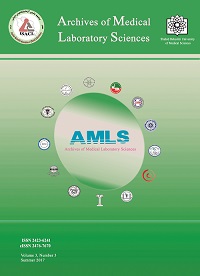The effect of drinking cold water on fasting blood glucose, urea, uric acid, creatinine, liver transaminase enzymes activities, lipid profiles and thyroid hormones in ratsfiles and thyroid hormones in rats
Archives of Medical Laboratory Sciences,
Vol. 3 No. 3 (2017),
13 May 2018
https://doi.org/10.22037/amls.v3i3.22355
Abstract
Background: The current study was designed to investigate the changes of fasting blood glucose (FBG ), urea, uric acid, creatinine, aminotransferase (AST), alanine aminotransferase (ALT), triglycerides (TG), total cholesterol (TC), low-density lipoprotein cholesterol (LDL-c), very low-density lipoprotein cholesterol (VLDL-c), high-density lipoprotein cholesterol (HDL-c), thyroid-stimulating hormone (TSH), thyroxin (T4) and triiodothyronine (T3) of rats after long-term drinking of cold water.
Materials & Methods: In this experimental study, 12 adult male Wistar rats weighting 220-200 g were used. The rats were divided into 2 equal groups including, control and experimental groups. The control and experimental groups received normal water (20 ° C) and cold water (4 ° C) for 60 days, respectively. At the end of the 60 days, blood was taken from the heart of animals. After separating the serum, concentration of FBG, urea, uric acid and creatinine, ALT, AST, TG, TC, HDL-c were assayed by spectrophotometer and LDL-c, VLDL-c were calculated by the Friedewald formula. The serum concentrations of TSH, T4 and T3 were identified by ELISA.
Results: Results showed that cold water significantly increased the levels of ALT,AST,TG, LDL,VLDL,TSH,T4 and T3 (P<0.05) and had no significant effect on urea, uric acid, creatinine, TC and HDL levels in experimental group compared to control group.
Conclusion: Cold water can have a devastating effect on the metabolism of the body in the long-term. Although more studies are needed.
- Cold water
- liver enzymes
- thyroid hormones
How to Cite
References
Mazengenya P, Bhikha R. A critical appraisal of 11th century treatise by Ibn Sina (Avicenna) on the anatomy of the vascular system: Comparison with modern anatomic descriptions. Morphologie. 2018;102(337):61-8.
Ibn-e-Sina AH. Al-qanun fit-tib [The canon of medicine]. Beirut, Lebanon: Alaalami Beirut lib Press; 2005.
Girona M, Grasser EK, Dulloo AG, Montani JP. Cardiovascular and metabolic responses to tap water ingestion in young humans: does the water temperature matter? Acta Physiol. 2014;211(2):358-70.
Brown CM, Dulloo AG, Montani JP. Water-induced thermogenesis reconsidered: the effects of osmolality and water temperature on energy expenditure after drinking. J Clin Endocrinol Metab. 2006;91(9):3598-602.
Nagasawa K, Matsuura N, Takeshita Y, Ito S, Sano Y, Yamada Y, et al. Attenuation of cold stress-induced exacerbation of cardiac and adipose tissue pathology and metabolic disorders in a rat model of metabolic syndrome by the glucocorticoid receptor antagonist RU486. Nutr Diabetes. 2016;25(6):14.
Zhang J, Pan T, Wang JHC. Cryotherapy suppresses tendon inflammation in an animal model. Journal of orthopaedic translation. 2014;2(2):75-81.
Stocker SD, Osborn JL, Carmichael SP. Forebrain osmotic regulation of the sympathetic nervous system. Clin Exp Pharmacol Physiol. 2008;35(5-6):695-700.
Mullur R, Liu Y-Y, Brent GA. Thyroid Hormone Regulation of Metabolism. Physiological Reviews. 2014;94(2):355-82.
Taylor PN, Albrecht D, Scholz A, Gutierrez-Buey G, Lazarus JH, Dayan CM, et al. Global epidemiology of hyperthyroidism and hypothyroidism. Nature Reviews Endocrinology. 2018;14:301.
Ribeiro MO, Carvalho SD, Schultz JJ, Chiellini G, Scanlan TS, Bianco AC, et al. Thyroid hormone–sympathetic interaction and adaptive thermogenesis are thyroid hormone receptor isoform–specific. The Journal of clinical investigation. 2001;108(1):97-105.
Kim B. Thyroid hormone as a determinant of energy expenditure and the basal metabolic rate. Thyroid. 2008;18(2):141-4.
Khemichian S, Fong T-L. Hepatic Dysfunction in Hyperthyroidism. Gastroenterology & Hepatology. 2011;7(5):337-9.
Upadhyay G, Singh R, Kumar A, Kumar S, Kapoor A, Godbole MM. Severe hyperthyroidism induces mitochondria‐mediated apoptosis in rat liver. Hepatology. 2004;39(4):1120-30.
Chen Y, Wu X, Wu R, Sun X, Yang B, Wang Y, et al. Changes in profile of lipids and adipokines in patients with newly diagnosed hypothyroidism and hyperthyroidism. Scientific reports. 2016;6:26174.
Harvey CB, Williams GR. Mechanism of thyroid hormone action. Thyroid. 2002;12(6):441-6.
Iglesias P, Diez JJ. Thyroid dysfunction and kidney disease. Eur J Endocrinol. 2009;160(4):503-15.
- Abstract Viewed: 2008 times
- PDF Downloaded: 233 times
